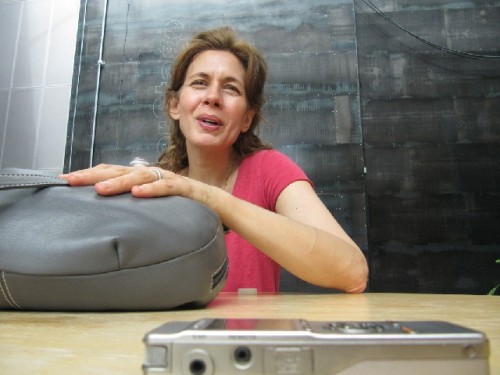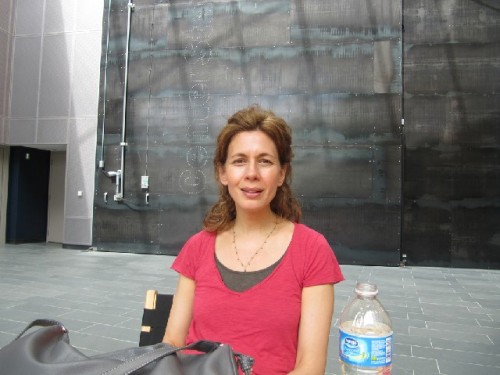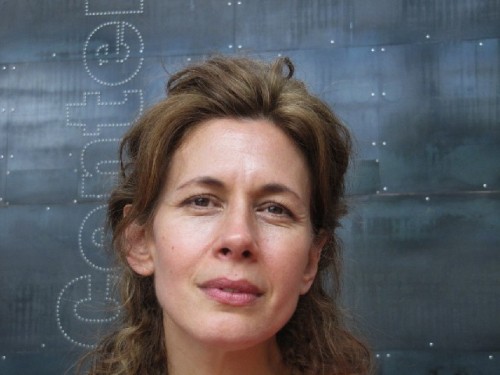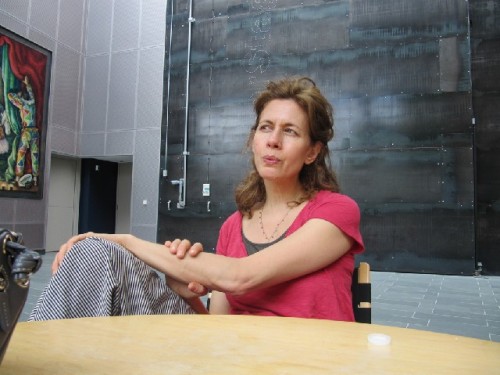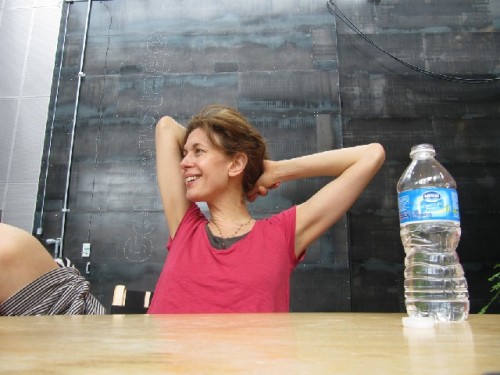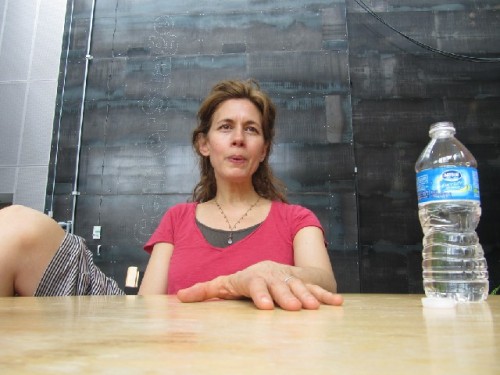Jessica Hecht Discusses Blanche DuBois
Streetcar Named Desire at Williamstown Theatre Festival
By: Charles Giuliano - Jun 30, 2011
This is the eight season for Jessica Hecht with the Williamstown Theatre Festival. Last year she was part of the all star ensemble for Our Town directed by Nicholas Martin. She has returned as Blanche DuBois in one of the great, indeed, perfect dramas of the 20th century, Streetcar Named Desire.
We spoke with her last year and it was delightful to engage in another dialogue. On a sunny Berkshire morning we conversed in a lounge at WTF. Again she commented on expoloring real estate and a possible second home for her family within walking distance of the theatre.
Charles Giuliano Did I see you on The Good Wife this year?
Jessica Hecht Yeah. Do you watch that show?
CG Love it. Seems that WTF folks show up.
JH Dylan (Baker) did some.
CG He was a bad guy. Weren’t you the wife of the DA?
JH Yeah.
CG You were ratting him out and wanting to divorce him.
JH The episodes all dribble into one big pool.
CG I got excited to see you. Hey, I know her.
JH It’s kind of cool.
CG Like seeing a member of the family on TV. You were also in Three Sisters at Classic Stage this past season which was very well received.
CG The amazing Austin (Pendelton) directed. It was such a gift to me partly because of my history here. And my understating of Austin’s work which he has been doing for his whole career. I was really driven to work with him. He’s so rare in the way he works with actors. First of all his knowledge. He started Three Sisters here thirty years ago. He started working on it here. He’s done seven productions two of which were here. There’s a book called “The Actor’s Chekhov” which is about productions done at Williamstown.
“The Actor's Chekhov : Interviews with Nikos Psacharopoulos and the Company of the Williamstown Theatre Festival, on the Plays of Anton Chekhov” [Paperback] Jean Hackett (Author), John Guare (Foreword), Nikos Psacharopoulos (Contributor).
It’s a great book.
CG Weren’t you in Three Sisters here?
JH Yes. (2007)
CG With that very edgy set with all the wood. (Allen Moyer) It didn’t look very Russian.
JH This one (Classic Stage) was very rich in a completely minimal way. It was done in the round with four or five incredibly rich looking pieces of Russian furniture. A dining room table. But the miracle of that was the way that Austin worked with us. It was incredibly detailed and generous. He is the most supportive director you will ever encounter in your life. If you ever want to feel that you are capable of anything work with Austin Pendelton whether you are capable or not. He endows you with that feeling.
CG What was different about the production at WTF and the one at Classic Stage?
JH The production there (Classic Stage) is not dissimilar to what we are doing here (Streetcar Named Desire). It was done completely in the round. Your back would be audience members for big chunks. It was done in a very intimate way. It is a little less intimate here because a number of seats are still in an audience. Three Sisters here was totally proscenium. The one we did in New York was very, very intimate. Although I believe strongly that the foundation of a lot of what I did was gotten here with Michael Greif. But Austin believes in a fluidity so you may not do anything twice. You are completely responsible for using yourself and the space differently every night. It can be harrowing, but thrilling. At least fifty percent of the time.
CG You were nominated for a Tony in A View from the Bridge so this seems to be a good period for you.
JH I can’t complain. I feel that I have gotten to do truly great productions. More than anything great plays. But I feel that the difficulty of our time for careers in theatre is about getting your hands on these parts and I have been so lucky.
CG In what sense?
JH There’s a lot of competition and a division between people who are doing a lot of new work. I lucked into doing what I consider a lot of contemporary classics. Great plays written in the 20th century and on.
CG Such as?
JH A View from the Bridge, Brighton Beach Memoirs, Three Sisters which is turn of the century and obviously Streetcar. And Broadway Bound which we did with the same director David Cromer. He did a beautiful production of the two Neil Simon plays which are partners Brighton Beach Memoirs and Broadway Bound. They were very short lived because of finances. They were on Broadway not last year but the season before.
CG A lot of people feel that you were robbed of the Tony by Scarlet Johansson.
JH I’m sure a lot of people say the same thing this year because of Ellen Barkin. They’re wonderful actors. There’s just such a tremendous amount of politics.
CG They always seem to give the Tonys to the Hollywood guys.
JH Yeah, they do, a fair amount of time.
CG You seem to be truly a theatre person.
JH I feel I’ve struggled in my heart. That’s what I’ve worked to be better at over the past several years. Although I just did a pilot for HBO and it may be picked up. The actors were amazing. It’s called Spring Fall and it’s about a fashion house in New York. It’s a really interesting show with Hope Davis and Tea Leoni, Sigourney Weaver, Stockard Channing. It’s a great cast of women. I would be the best friend of Tea Leoni who runs the fashion house. I would be an oncologist who is woven into the story. It’s also just wonderful to play a smart, interesting contemporary woman.
CG That seems to be who you are.
JH A wonderful friend of mine, a playwright named Nina Bieber, she’s quite beautiful. She turned 45 and said something like, oh, look at me. Her mother who is very successful and wise said “The older you get the more you have to work on your mind.”
CG In the arts we just keep going.
JH I look at people like Louis Zorich who is married to Olympia Dukakis. He’s 86 and was in our production of Three Sisters.
CG There are so many outstanding Off Broadway shows Like Venus in Fur at Classic Stage which get great reviews but don’t make it to Broadway.
JH She is a great actress (Nina Ariadna) but doesn’t yet have a name to sell tickets. You need that to get to Broadway.
CG Do you have a name that sells tickets?
JH That’s such a good question, such an interesting question. In an established (Off Broadway) theatre I would sell tickets probably. But I don’t think I would be on Broadway if it was just me and a bunch of unknowns.
CG Did being nominated for a Tony make a difference?
JH Not a thing. There’s nothing that comes out of it related to film and television. At all. No recognition by the theatre community translates into film and TV. Isn’t that startling and depressing? Not a thing. Maybe if I had won the Tony award but I don’t know. It’s very sobering.
CG How does one endure in a life in the arts? You probably got more for a day shooting for TV than a week Off Broadway.
JH Without a doubt.
CG Probably $1,500 a day on a TV shoot.
JH No, more. You can do a movie for $10,000 a day.
CG How about a week on Broadway?
JH For a week on Broadway I can’t imagine myself making more than five grand. Ultimately say a thousand dollars a day. Where a movie star, having never done Broadway before, and having less to do in terms of carrying a play, would, at a minimum, make twenty five grand.
CG It doesn’t seem fair.
JH It’s not fair at all but they’re the ones selling the tickets.
CG Having Scarlet Johansson in the show means that people come and see your work.
JH Exactly. She’s also an incredibly nice person. She’s very girlfriendly. At least she was to me. You could really talk about stuff with her. Like life.
CG Have you seen Chris Rock in The Mother Fuc**er with a Hat?
JH No. The only thing that makes me crazy about these situations is when a big star in a show gets a lot of acclaim or press is the perception of critics or whoever is enamored of the show is the perception that a film actor is doing theatre successfully because they have stage craft. That concept that they can easily do theatre. I would say that 90% of the time the movie star doing the play is deeply talented but successful on the stage because a huge amount of rehearsal has been devoted to assembling a performance that is stage worthy. Not because they came in with this tremendous stage craft. You had spent a large part of your time as a cast working with that person. It is absolutely worth it but the vast majority of the people in theatre resent that part of it. The perception is that the individual is equally capable as, I’m trying to think of somebody who is a great stage actor but doesn’t get equal time. You could look at John Douglas Thompson and look at someone who is doing a knockout performance on stage. Like Chris Rock, who is an enormously talented person. If you saw him on stage and said this guy has knocked it out of the park and has tremendous stage craft, on the level of a John Douglas Thompson, well, I would find that somewhat insulting to the hundreds of hours that John Douglas Thompson has spent figuring out how to perform plays on the stage.
Do you know what I mean?
CG I’m blown away that you mention John Douglas Thompson. We are close friends.
JH Oh, so you do know what I mean.
CG I have an ongoing project with John to post dialogues about the Shakespeare roles that he performs. I have been surprised that he does not get TV and film work. It just seems inevitable. John is also my tormentor. He prepares so intensely that in our dialogues he has the same expectation from me. When I had trouble with his Richard III at Shakespeare & Company he was frustrated that I was fixated on Oliver’s interpretation.
JH He’s a great artist of the stage. Chris Rock is an enormously talented comedian but you can’t compare his stage craft. They each have a different gift and I guess that’s what gets to me sometimes. I don’t know if that’s an apt comparison but you do know what I’m talking about. You might see Chris’s show and say the stage craft was amazing. I would say no. He’s a remarkable performer and his stage craft is not what you should be remarking on. His comic timing maybe. But compare that to spending a life in the theatre as John magnificently has done.
CG What do you mean by stage craft and what does it mean to you?
JH Two things. One is a terrific respect for a work ethic. I feel that it’s really hard work to do a play. The main thing I am interested in is reading the play over and over again until you get to start to hear the story in your own head. Also just the amount of time that one must spend with a play in order to integrate it into something real is. I feel that it is such a lengthy and intuitive process for me. I read it over and over again that’s really what I do.
CG Do you take notes as you read?
JH I do. I hear different things. I kind of score the script like a piece of music. Working on this production of Streetcar our director, David Cromer, has a unique, quite a brilliant way of approaching it, which is that he asks you to explain the story over and over. You might have a huge monologue, for instance, that is full of emotion. You gravitate to the character. He believes that if the writing is strong enough, which it obviously is in Streetcar, the detail of what happened, of what the character is talking about, is the most precious thing for the audience to hear.
In Streetcar I have a monologue about what happened to the boy. The boy I was married to. It’s a very emotional monologue and the only way the audience is going to feel anything is if you go step by step. So you say, there was this boy, and we got married, then I walked into this room and he was with this older man who is his friend.
As we worked on it David said “You can cry. You can feel unable to go on.” But the most important thing is the detail. Any time we tell a story to another person it’s the detail. When you say like as you said “My wife and I had an amazing winter and when I looked out the window…” The detail is what’s making the other person feel something. Not you sitting there crying about the dead bird. The details. The bird was lying there and I saw him struggling. That’s what’s interesting. And I think that’s a genius way to approach the classics and approach my work.
CG A number of the reviewers of Streetcar noted that it was very conversational partly because of the intimacy of the theatre including seats on stage that were unusually close to the actors. That meant that the dialogue was less inflected and projected than is the norm for theatre. This resulted in both positive and negative responses from critics. Perhaps it mattered where you were seated. A colleague was on stage and had a different reaction from us. We were actually in temporary seats behind the last row. So it was more of a strain to hear all of the dialogue.
There were also widely different opinions about the set. Because of the angle of the free standing stairs on occasion I couldn’t see you. Also in the round you were projecting to two fronts. A lot of complex aesthetic decisions went into this production.
JH And very definite aesthetic decisions because he had done it in Chicago the same exact way and that was his dictate here. He said “That’s what I’m going to do.”
CG Did you see Streetcar in Chicago?
JH No and it’s good that I didn’t. He found some things that were successful and some things that were not in that production. He never talked to us about those performances. He felt that to do this play in a way that a lot of people, mentally, envision how it has been done, they have seen the film before.
CG How do you forget?
JH I watched the film many times in the past. I didn’t watch it in preparation for this. But that film is not the play. It’s not even the same text. The film was an adaptation of the play.
CG Even though Elia Kazan did both. Directed the play in the theatre and for film.
JH It was not the same script and Brando was very definite about certain things he wanted to do. Vivian Leigh was not that well emotionally when she was doing the movie.
CG Of course that is precisely the quality that comes through in her performance. In my review of Streetcar I referred to the fact that in that role she drew on her personal life and we are aware of her issues and problems. What is the line about keeping my hands off the children.
JH Yeah, “I’ve got to keep my hands off the children.”
CG That was her issue. She couldn’t. Where you are an actor. I assume that’s not your life. So you have to go somewhere to find that. We read into Leigh’s performance based on biography.
JH Because that was who she was. But that’s her. That’s not the part. That’s Vivian Leigh’s imprint but that’s not what’s on the page. If you look at the page it has nothing to do with anything but her obsession with her young husband. She’s not a pedophile she’s obsessed with her young husband. And what happened in that relationship. He couldn’t have sex with her. That’s what’s in the script.
CG But then she made a move on the delivery guy.
JH Right because she never accomplished. She is so devastated that her young husband killed himself. As a result of her discovering them and her saying “You disgust me.” She said that to him. She says I saw and you disgust me. So she has this terrific guilt her whole life.
CG How challenging was Blanche for you?
JH Oh, it was deeply challenging. The deepest challenge. She’s a survivor. She doesn’t die in the mental institution. She goes on. In fact Williams said, she will go on. She will seduce the doctor. And she will go on. It was challenging to find something to find my own voice in it. Because why would I do that? Why would I just follow suit and just follow somebody else’s interpretation. Especially when our director didn’t care for the movie. He found it fascinating. Fascinating. Thrilling. But it’s not the play. That’s the most important thing that he imparted to us. This play is not what you know it to be. Most people who come to this production, or the one in Chicago, say they had not idea that this is the play. My perception is connected to this or that production or whatever.
CG That said I can find you within the tradition of Blanche.
JH Within the parameters.
CG That’s not true for Stanley. Sam Rockwell is presenting a very outside the box portrayal of Stanley. Very against type with no physical resemblance to what we would expect. You don’t see him as a devastatingly handsome guy who completely dominates and manipulates Stella. What you find in his Stanley is so ferocious. What was it like for you coming up against that white hot intensity? In the famous “Stella” scene we saw Brando outside yelling up to her. Here we see Rockwell slamming and pounding on the set with physical energy. When Brando got into the issue of Napoleonic law it was cerebral as he got into Blanche’s head. Rockwell’s Stanley is much more raw and primitive. It’s physical energy and assault. How did you react to and feed with that?
JH I found that thrilling. I find that absolutely right. There’s an aspect of the script that most people miss with Stanley. He was in the battle of Salerno (Landing September 3, 1943). It’s mentioned at the end of the play. Four out of five soldiers died in the most brutal battle. The survivors suffered what we would today identify as post traumatic stress.
CG So that’s what you see in him.
JH It’s an aspect of what he is doing. He also has a fantastic physical relationship with Stella. He feels very threatened by Blanche. So those are the two things. He has this post traumatic real craziness going on. If you talk with anybody who really knows this play, David Cromer, or Austin (Pendelton) who knows this play quite well will say, if you don’t understand that about Stanley, that he survived a battle in which he killed probably dozens of people, by hand or whatever, and women, horrible shit, you will miss a huge part of that character because he has been transformed by that. It is so timely to have someone like that.
Sam and I worked for such a long time on the play. We read the whole play together over and over again.
CG Where did you do that? In New York?
JH Yeah. We only have three weeks up here.
CG In my opinion Streetcar has to be one of the great American plays.
JH It’s a perfect play. The dramatic arc and the events are so finely laid out. And the story of somebody’s demise and continuum that they keep going. All three of us keep going through the brutality of what we have created for us. The hellishness that we have found ourselves in. I have terrible luck. Blanche has terrible, terrible luck.
CG In that first scene with Stella she is greeting you so warmly. You start to anticipate and project that she is mad at you for losing the family home and squandering the inheritance. In fact she hasn’t said anything but you are defensive and losing it. From that moment we sense that you are deeply disturbed. We learn that almost immediately in the play.
JH She has seen so much horror. And she was left alone in this house. They have no money and she is left alone with all of these dying relatives. She spent all of her money to bury all of these people. In my mind she is really a very good person who has had horrible luck. She feels incredibly guilty about what she did to this boy.
CG You think she did it to the boy?
JH Oh, without a doubt. Her whole life she has tried to get out from under. It is such a terrible thing. It is the pathos of her life that she believes strongly that she killed this beautiful boy by telling him that he disgusted her. That she saw this person that she loved blow his brains out an hour after she found him and told him how disgusting he was.
CG Stanley has stumbled onto the letters. You don’t care about the real estate documents but the letters are different.
JH The letters. It’s very intriguing and the play feeds you all of that.
CG Do you feel that we are too fixated on the movie in what we expect of the play?
JH I do feel that often. My mother was in the audience for the Thursday matinee. She heard someone say “They completely misinterpreted it. She shouldn’t look like a school teacher. She’s a floozie.” And my mother said “I don’t know.” As she watched it she enjoyed it and said this and that “There are all these ideas that she is a certain person.” She’s not a floozie. Why would you say that? She didn’t start out that way. She has been driven to sleep with all these men because of her horrible, horrible self esteem. She feels the worst of anybody you can possibly imagine. Like any feeling we have on a bad day. She feels that she let all these people down. Who died. The boy, the primary person in her life, she killed. She keeps trying to get out from under that and she keeps talking and talking and talking. She hopes for something. But she has obviously lost it many times over.
CG In the film you feel that Blanche is attracted to Stanley. The famous scene of their first encounter when he is hot and sweaty. He takes a beer and pours it over his head to cool down. We see her fascination for the animal sensuality of Brando. In this production we don’t sense that sexual tension. When he rapes her it comes as a surprise.
JH David Cromer was not interested in that. That was a big thing he was not interested in.
CG Then why is Stanley attracted to her or is it just a violent assault?
JH She’s fascinated with him but I guess it’s assault in some ways. If you keep with the energy of the war and what that is. David was not interested in that aspect. We were interested in that aspect in many ways. He was not. Not really. That I would say was a directorial choice.
CG It is complicated when we come to the theatre feeling that we know the play. There is a notion of what the play is or should be. Often critics are reacting to that knowledge, insight and history of performances. That influences how they approve or disapprove of the performances. Because they confirm or deny their received understanding of the material. It can be difficult to come to the play with a fresh eye.
JH I find that so strange. Because most of the critics haven’t read the play. They’ve only seen other productions. You are seeing what somebody else perceived so you are limiting your own interpretive integrity or intellect. If you say this person was definitive how would you even dare to say that if you haven’t read the play? That could have been a director’s complete choice.
CG You were the only one in this production who attempted a regional accent. Stanley is Polish and in that sense not really Southern. And yet the location is so specific. It’s 1947, French Quarter, New Orleans. It’s not Cincinnati.
JH I think he was very interested in me being a part of something that is gone in this world.
CG The last flower of Southern womanhood.
JH Exactly.
CG Just a last question. In terms of degree of difficulty is this the most difficult role you have taken on?
JH Yes, this and A View from the Bridge. They were both the most challenging roles I have ever done.
CG This is your 8th season at WTF.
JH I did many great parts here. (Our Town, The Torchbearers, Three Sisters, Blithe Spirit, The Autumn Garden, Top Girls, Light Up the Sky, The Most Fabulous Story Ever Told) I did two new plays early on The Most Fabulous Story Ever Told. And Light Up the Sky that was a great part. But I don’t just come for the part. It’s the genius of the company. I love being here.

